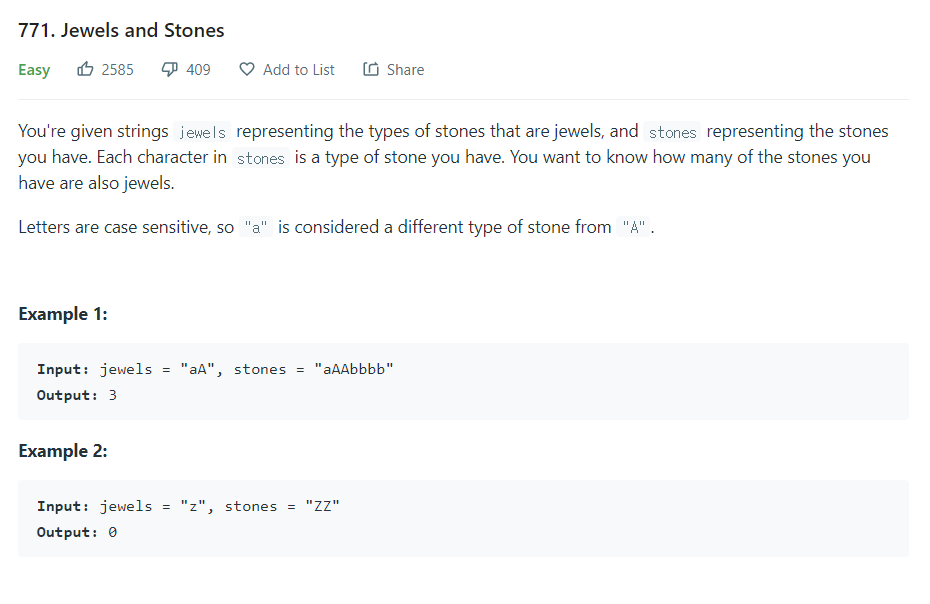-
J는 보석이며, S는 갖고 있는 돌이다. S에는 보석이 몇 개나 있을까?
대소문자는 구분한다.


1. 해시 테이블을 이용한 풀이 (32ms / 14줄)
class Solution:
def numJewelsInStones(self, jewels: str, stones: str) -> int:
freqs = {}
count = 0
#돌(S)의 빈도 수 계산
for char in stones:
if char not in freqs:
freqs[char] = 1
else:
freqs[char] += 1
#보석(J)의 빈도 수 합산
for char in jewels:
if char in freqs:
count += freqs[char]
return count
- 갖고 있는 돌의 각각의 개수를 모두 헤아린 다음, 보석의 각 요소를 키로하는 각 개수를 합산하면 풀이할 수 있다.
-
먼저 freqs라는 해시 테이블을 선언한다.
-
그리고 돌의 모음인 stones를 문자 단위로 하나씩 분리해 반복한다.
-
만약 처음 등장한 문자라면 1을 선언하고, 기존에 있던 문자라면 1을 더한다.
-
입력값 stones = 'aAAbbbb'는 해시 테이블 freqs에 다음과 같이 저장된다.
-
{
'a': 1.
'A': 2,
'b': 4
}
#각 문자별 빈도 수가 저장된다.
-
이 중에서 보석을 나타내는 jewels의 문자를 꺼내어 해당 문자의 빈도 수를 합하면 최종 결과가 된다.
- 이 문제에서 보석 jewels의 입력값은 jewels = 'aA'이므로, freq['a']의 값 1과 freq['A']의 값 2를 더하면 최종 결과는 3이 될 것이다.
2. defaultdict를 이용한 비교 생략 (28ms / 10줄)
class Solution:
def numJewelsInStones(self, jewels: str, stones: str) -> int:
freqs = collections.defaultdict(int)
count = 0
#비교 없이 돌(stones)의 빈도 수 계산
for char in stones:
freqs[char] += 1
#비교 없이 보석(jewels)의 빈도 수 합산
for char in jewels:
count += freqs[char]
return count
- 키가 존재하는지 여부를 매번 판별할 필요가 없기 때문에 이처럼 바로 계산할 수 있고, 코드 수도 많이 줄어들어 깔끔해졌다.
3. Counter로 계산 생략 (32ms / 7줄)
class Solution:
def numJewelsInStones(self, jewels: str, stones: str) -> int:
freqs = collections.Counter(stones) # 돌(stones)의 빈도 수 계산
count = 0
#비교 없이 보석(jewels)의 빈도 수 합산
for char in jewels:
count += freqs[char]
return count
-
Counter를 사용하면 코드를 더욱 짧게 줄일 수 있다.
- 각 개수를 계산하는 부분까지 자동으로 처리할 수 있기 때문이다.
-
아울러 Counter는 존재하지 않는 키의 경우 KeyError를 발생하는 게 아니라 0을 출력해주기 때문에, defaultdict와 마찬가지로 에러에 대한 예외 처리를 할 필요가 없다.
- 단순히 jewels에 포함된 문자의 개수를 계산하기만 하면 된다.
4. 파이썬다운 방식 (28ms / 1줄)
class Solution:
def numJewelsInStones(self, jewels: str, stones: str) -> int:
return sum(s in jewels for s in stones)
- 각 문자를 하나씩 출력하는 리스트 컴프리헨션
>>> [s for s in stones]
['a', 'A', 'A', 'b', 'b', 'b', 'b']
- 여기에 약간 비교 구문을 추가해 stones의 문자 s가 jewels에 포함되어 있는지 여부를 출력할 수 있다.
>>>[s in jewels for s in stones]
[True, True, True, False, False, False, False]
- 이 값을 다음과 같이 sum 으로 합산한다.
>>>sum([s in jewels for s in stones])
3- 리스트 컴프리헨션을 의미하는 대괄호 []는 제거 가능하다.
>>>sum(s in jewels for s in stones)
3